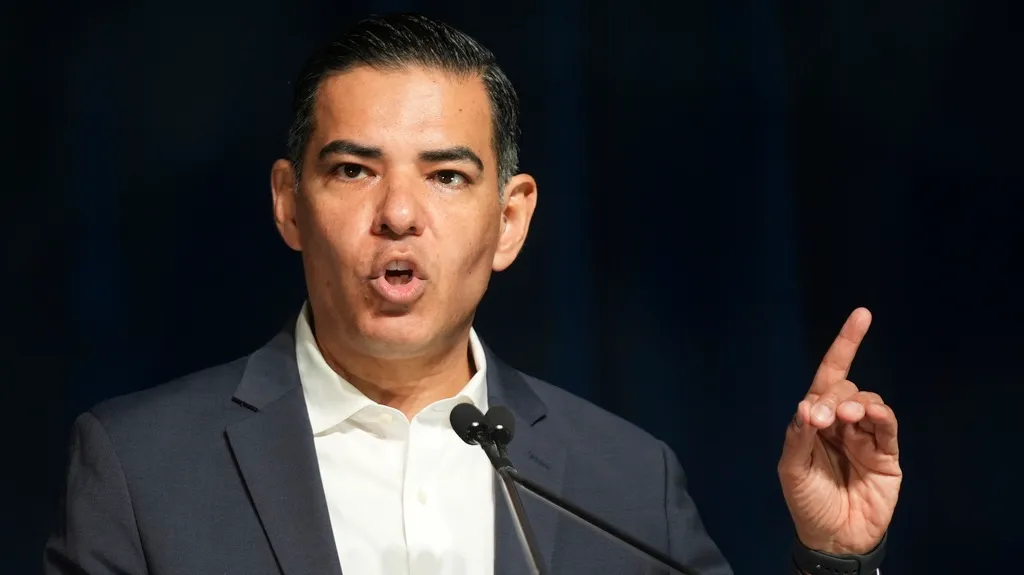September 17, 2015
Transgender Student's Battle Divides Rural Virginia Town
Larry O'Dell READ TIME: 5 MIN.
Amid the cornfields and marinas dotting this conservative tidewater Virginia enclave between the York River and Mobjack Bay, people are divided over what one local pastor calls "the civil rights issue of this generation" - how to deal with a transgender student's demand to use the boys' restrooms at the local high school.
"If they're not fixed like a man, they should not use the men's bathroom," Gary Pilkinton, a 56-year-old movie special effects worker, told a reporter recently outside the local Wal-Mart.
Another shopper, Cheryl Walker, took the opposite view.
"I don't care what bathroom he uses," the 71-year-old retiree said. "Just don't go potty on the hallway floor."
Gavin Grimm, who was born female but identifies as male, sued school officials over a policy requiring him to use either the girls' restrooms or a single-stall, unisex bathroom open to all students. The 16-year-old Gloucester High School junior claims it's stigmatizing and discriminatory. Some classmates and their parents argue that his presence in boys' bathrooms would be disruptive and a violation of privacy.
It's a new and decidedly modern issue for this rural eastern Virginia county that dates to 1651, promotes itself as Daffodil Capital of the World and takes pride in its history: home of George Washington's grandmother and the Indian princess Pocahontas.
But the dispute, which unfolded in heated school board meetings and spilled into federal court, is not unique to Gloucester. A transgender student's use of the girls' facilities in a Missouri high school triggered a late-August backlash by parents and a protest by nearly 200 students. Last year, Maine's highest court ruled that a transgender fifth-grader could use the girls' restroom.
Grimm said he's not surprised by the division in Gloucester County.
"There's the side that's like, 'Wow, Gloucester is really in the Stone Age with this one - just let you pee and be yourself and be happy,'" Grimm said in an interview. "And there's a lot of people from Gloucester who are like, 'It's the Bible Belt and Satan is in our town.'"
Grimm, represented by the American Civil Liberties Union, says in the lawsuit that he started refusing to wear girls' clothes by age 6 and told his parents he was transgender in April 2014 - a year before Caitlin Jenner made an international splash by publicly divulging her transgender status.
Grimm's parents helped him legally change his given name and took him to a psychologist who determined he has gender dysphoria, characterized by stress stemming from conflict between one's gender identity and assigned sex at birth. Grimm began hormone treatment to deepen his voice and give him a more masculine appearance.
During the last school year, Grimm was allowed to use the boys' restrooms and did so without incident until some parents complained. Amid the ensuing turmoil, the school board voted 6-1 for the policy restricting students with "transgender issues" to the single-stall facilities or those corresponding to their biological sex. Grimm complied, using a restroom in the school nurse's office, but found the board's solution unbearable.
"It's humiliating, it's ostracizing and I don't want to take that walk of shame to the unisex bathroom and know that everyone who saw me go in there knows why I'm in there - because I'm different, and I've been marked different by my school and publicly. ... I'm not comfortable with it whatsoever. I'm not an 'other' and I'm not unisex, I'm a boy," Grimm said.
Some have used other words, including "it" and "freak," Grimm said - dehumanizing insults that sting, even though he believes deep down that they stem from ignorance. He recoils at public discussion of his genitals and disputes suggestions that he is just seeking attention.
Gloucester, a community of about 37,000, voted nearly 2-1 for the Republican candidate in the last two presidential elections in a state won by Democrat Barack Obama. A recent random sampling of local opinion there yielded a variety of outlooks.
Some are mostly concerned about Grimm's well-being.
"I think it's a hard situation, especially for somebody so young," said Marcella Randal, 68, during a smoke break on a bench outside the senior center on Main Street. "It could also be dangerous. You know those young boys in high school aren't going to understand that."
Kim Williams, owner of the Short Lane Ice Cream shop down the street from the high school, said she doesn't hear much about the dispute from students who drop in. She wondered if the controversy could have been handled by letting the students decide.
Even among the student body, however, there is sharp disagreement.
"The way I look at it, gay, straight, transgender, hermaphrodite - I don't discriminate," Gloucester High School senior John Pence said. "I don't see why it's such a big deal." Pence said it seems older people have raised the most ruckus.
However, student Scott Williams told the school board that other teens who don't want to run into Grimm in the restroom would speak up if not for the fear of being labeled intolerant.
"My friends and I are uncomfortable with co-ed bathrooms and locker rooms. Don't we matter too? How is it fair to advance the rights of one by violating the rights of a thousand? The unisex restroom isn't perfect, but it's the best option," he said.
Williams was among about three dozen residents who made impassioned two-minute pleas to the school board, whose meetings often draw no public comments at all.
Local pastor Ralph VanNess asked, "Where does it end?" He added, as the audience applauded, that the rights of "the other young men in Gloucester High School" should be respected.
But another clergyman, Fred Carter, told the board: "The issue we are talking about now is the civil rights issue of this generation. Who are we to judge?"
Cheryl Walker sympathizes with Grimm's plight, but isn't ready to elevate it to that level.
"In Gloucester, we have so many issues," she said outside the Wal-Mart, citing drugs as an example. "Let's get on with more important stuff."
Most school officials have clammed up about the dispute, citing the ongoing litigation. The exception is Kim Hensley, the board member who voted against the policy.
"I think this is a civil rights issue," she said.
The school board defends its policy in court papers.
"To respect the safety and privacy of all students, the School Board has had a long-standing practice of limiting the use of the restroom and locker room facilities to the corresponding biological sex of the students," the board says, adding that it believes the policy "is in the best interests of all students."
Barbara J. King, who's an anthropology professor at the College of William & Mary and a Gloucester County resident, said the community backlash reflects a lack of understanding about what it means to be transgender.
"A lot of this is based on fear - that changes happening nationwide are not always known and understood in smaller communities," King said in an interview. "It seems to be a continual discussion of privacy. I just have a hard time understanding what the big harm is and what the big danger is. I've never had that explained to me."







